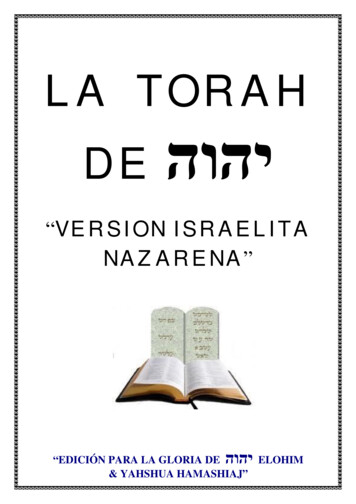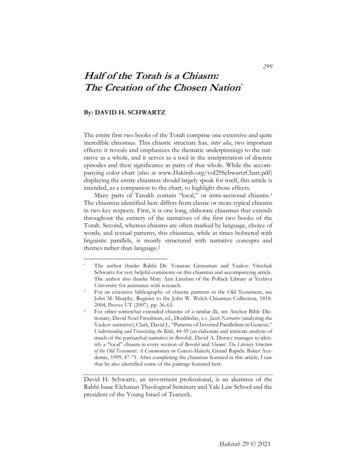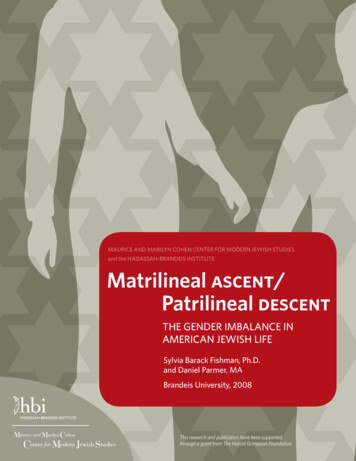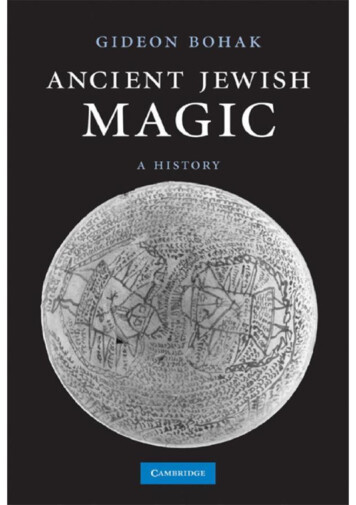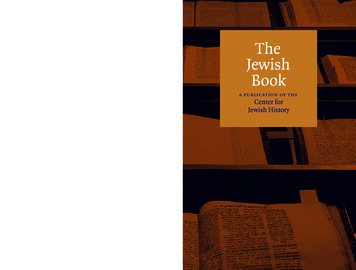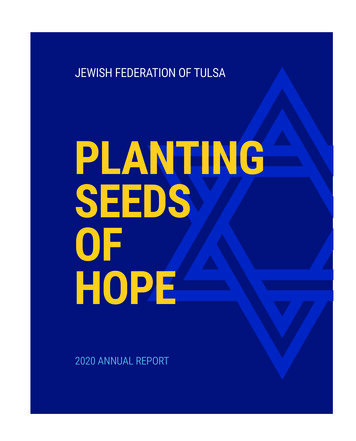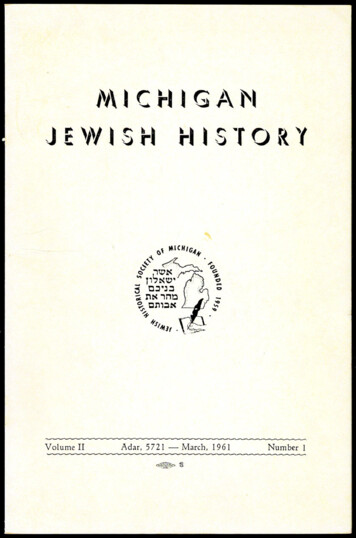
Transcription
BERESHITOctober 16, 1971RABBI NORMAN LAMMTHE JEWISH CENTER"HOW TO READ THE TORAH"IThese comments on "How to Read the Torah," are not meant to be ademonstration of cantillations or a means of training formal Torahreaders.Rather, they are an attempt to set some guidelines as webegin again the cycle of portions of the Torah.Thev ar intended aswell as an introduction to our various adult classes, as all Jews begintheir annual renewal of the study of Torah.At one point in today's Sidra, we read"This is the book of the generations of man."f U y\V* Ln" 2 O S%Most commentators takethat to mean not "book" in the formal sense of a volume, but as alisting of the generations that derived from Adam.Ramban, however,takes the word literally, and tells us that K jfoh-HS *1OOOi- v O - - it refers to the entire Torah,which is the "book of the generations of man."mankind.Torah is the story ofThe Book is apposite to Man.The Kabbalah affirmed this idea in manv ways.For instance, theHoly Ari maintained that, by mystical permutations, the number of soulsof Israel present at Sinai is equal to the number of letters in theTorah.Again, we find the equivalence between Book and Man.Hence, the approach to know the Book is akin to that of knowingMan.You learn how to understand Qfrom how you understand f tC .Booksmay teach us much about people; but people can tell us more about books.And this is so especially concerning the Book of Books, the Torah.
-2riThe first thing that we must learn is:respect.In order genuinelyto know a man, vou must consider him worthy of your study and friendshipand concern.If he is not worthy, then your knowledge of him issuperficial and unimportant.of Torah.And what is true of man, is true of text,At the very least, respect means not to ignore it.To sit inthe presence of Torah and not consider it, is like staying in the presenceof another human being and acting as if he does not exist —insults are more humiliating than that.serious, and that means —To read Torah, you must behigh minded, truly religious.of Torah may never be flippant.and fewA real studentYou may be puzzled by a pasuk, or be putoff by a parashah, but you must always approach Torah with humility.The founder of the HaBaD movement, in his? I b I W . , gives usan interesting derivation of the custom of Jews to walk with their headscovered.The reason is: \1 M3 , modesty.two reasons:warmth or modesty.Clothing is worn for one ofThe head covering is too small to servefor purposes of warmth; it is there for reasons of ( '1 J .It is ourwav of expressing before God th limitations of our intellectual selfsufficiency.We cover our heads to indicate that we have a degree ofbashfulness about our intellectual inadequacy in the face of God.Thisis ho w we approach the study of Torah -- with respect and humility.This does not mean that what is demanded of us is intellectualcapitulation and submission; merely —modesty and reverance.Respect for Torah means also that we must not assume too much aboutTorah in advance.conclusions.Do not approach the sacred text with ready-madeI know people who read a portion of the Torah with a"nothing-but" attitude:the Torah is "nothing but" a collection of
-3Mid-Eastern myths; "nothing but" a record of early religioussuperstitions; "nothing but" primitive science; "nothing but" the fearof the unknown expressed magically*With such a presumptuous attitudeyou emerge from your encounter with Torah knowing nothing more than thesmug prejudices with which you began.In a sense, I would say that respect means:to Torah.else —not to get too closeDespite the fact that Torah is closer to us than anything W*" ?*ik p h P ' --you mustnot get too close to it,you must avoid excessive intimacy, the familiarity which breeds contempt -a fact true both of men and of books.When we are too much "at home"with Torah, when we are "pals" with the text, and we lose the distancewhich makes both for reverence and perspective, we allow ourselves theliberty of making snap judgments which are unworthy.That is why whenwe read the Torah we use the silver pointer.The Halakhah forbids usto touch the inner part of the Torah scroll.Should we contact theparchment, our hands become unclean —f*1 ' \icdl C --ancfthe reasonis, primarily, to keep us respectful by forbidding us to handle thesacred scroll directly.We must not lay hands on the Torah; thus welearn to respect it.IllThe second guideline in how to read the Torah is —its depth. * o) -**» 3Ji* " 0 S .the awareness ofJust as you do not "read" a man,because he is too complex and deep and requires studying and investigation,analysis and pondering, so it is with Torah.When you say of a man,"I can read him like a book," you diminish his humanity, you reducehimto a manageable and manipulable automaton, one whose Pavlovian reactionsare all predictable, and hence one who has been de-personalized into
-4a mere mechanism.answer is:So if we ask, How do you read the T orah?don't read it!Go much deeper than reading.—theReading of theTorah in the synagogue, in its formal sense, with all its carefullyprepared melodies and exact text is only the challenge to what we oughtto do, each of us, privately:go deep, ever deeper.It is not enoughto read, one must study; it is not pnousrh to I V * the Torah, one must.P. . . .0 ; it is inadequate to havethe Torah.O)c' ? o n e roust have" '/* ofFor both Man and Torah are livincr things, organic beings,and merely reading thn Torah is likp. describing a man's physicalqualities:in neither case have I captured the soul, the essence.That is why our tradition recommends at least four methods ofinterpretation, the famous V ) .It is because we know that thereis depth upon depth, layer upon layer, that the various forms ofinterpretation are valid.Several years ago, someone wrote a book in which he tried totrace the origins of Freud's seminal id* a of depth-psychology, that thehuman consciousness consists upon layer upon layer of awareness,andthat we can dig ever deeper until we come to the root of a man's psychiclife.This writef(Bakan) maintained that Freud derived his notions,despite the paucity o " his formal Jewish education, from the Jewishideas which were vaguely, but pervasively, present in his environment.One of these great ideas was that of the Kabbalah and its teachingthat the Torah must never be understood only onone level, but that itis a mine or reservoir of infinite layers of meaning, and that whenyou have plumbed one, you must still mine the next, and when you havedone the next, you must prepare to die even deeper to a newer and more
-5-profound level of meaning,not;I do not know if that w r i t e rI believe hr. exaggerates.direction of the equation.But certainly today lie must reverseTodav we know a ?reat deal about depth-psychology, about the layers of meaning in a man's life.conclude the same about Torah —of man."is right orWe must nowfor this is "the book of the generationsWhat is true of Man is true of Torah:depth upon depth, layerupon layer, level beneath levelIVThe third thing that we must learn in approaching Torah is that,with all our scholarly techniques and analysis to probe depth, aboveall learning must remain an existential encounter.When you truly knowanother human being, you know tnorp than th sum of his various parts,his physical description and psychic condition and his clothing and thestate of his liver and bile and cardiogram.merely that.There is a sense of mystery.a genuine experience.relationship.There is more to man thanThe encounter with him isMeeting him is what Buber calls an I-ThouYou see him as an equal Gestalt, not as a mereAnd so it is with the text of Torah.TTit."You must look upon it not asmerely an ancient document, not merel}? as a problem in legal philosophy,not merely as a record of ancient history, but as something living,something dynamic, as an encounter with a "thou," one which preservesand realizes the eternal Thou.In Hebrew, daat (- *» ) means morp than lust intellectual cognition."Knowledge" in the Biblical schememeans total knowledge, whichincludes the physical ard the spiritual, the material and thepsychological and the intellectual.When Adam "knew" his wife Eve, the
-6-knowledge covered all areas of human existence, from the sexual tothe spiritual.of God:The same word daat or knowledge is used for the knowledgeit means more than merely a profound grasp of theology or alisting of the philosophical interpretations of the negative attributesof God.It comprehends the totality of existence.from Man to Book:So too, we learn 0' ?) /s"i the knowledge of Tor ah,is more thananalysis; it is a profoundly existential meeting with Torah itself.Ina word, it is a learning of love.This encounter of love, both in the case in Man and in the case ofThe Book, involves a recognition that the one we encounter has absoluteindividuality, a uniqueness that is irreplaceable.If I know (love)another human beinp, then I know that person as one who cannot beduplicated, who is utterly different.And the same holds true when Iknow a passage of Torah.Furthermore, to know in the sense of love means -- to want toknow more!Maimonides, in the beginning of his great Cod§, teaches us,concerning the love of God, that when you contemplate the marvels ofnature, you begin to love God and ttam 'VVVf J)V" c \ *\\\ u\l )c 0 3 »Kimmediately you are seized with an uncontrollable passion to know thegreat Nanv .So it is with man too.When you love someone, your desirefor knowledge, your appetite for knowing him or her more, is insatiable.The more you know, the more you want to knew the condition that must obtain in Torah.And that is preciselyIf you study Torah with theright attitude, that of love, you will never be satisfied with whatyou know; you will always strive for more.Furthermore, reading or studying Torah with love also sensitizes
-7you to the novelty and surprise that are latent within Torah, to theunpredictably delightful ideas waiting to be coniured up by love andintelligence,A year or two aeo, there appeared a book edited by Marshall andHample, which was a collection of children's letters to God.One ofthem, most appropriate this Sabbath, when we recommence the cycle ofthe Torah, reads as follows:Dear God:Maybe you can write some more stories because we'vealready read everything You have written more than once.Thanks in advance.Some people take that childish attitude with regard to the studyof the Torah as we commence Bereshit ones a ain:the same laws, not a single change.the same stories,Indeed, should the Torah readerdecide to make a single change, we pounce upon him and correct him.conclusion -- it is repetitive and boring.attitude.TheBut that is a childishIf our attitude is mature, if we approach Torah with respect,with awareness of its depth, and with love, then the new cycle ofsidrot means for us thp anticipation of n w discoveries, novel insights,great idea we have not yet been introduced to.VFourth, and finally, the right attitude for the study of Torahmeans that we must read it critically and persistently, usinc* everytool of intelligence and research.To approach Torah with respect andwith love does not mean that we can get awav with "frumkeit," withpietv alone.A student of Torah must be pious, but piety itself is noguarantee or substitute for scholarship.ifyouacknowledge that
-8Torah has depth, ard you approach Torah with raspect and love, you willalso want to be deserving of Torah f s love and respect in return.Aswith a human being, if you relate to him or her uncritically, withoutdiscrimination and taste, guillibly and simply -- you may not find youraffections reciprocated.naivete.Torah, too, is not satisfied with unsophisticatedIt demands far more from us -- a critical attitude, awillingness to meet Torah T s problems head on, acumen, and discriminatingintelligence.The Zohar, in a remarkable passage that sounds as if it were takenout of the courtly tradition of love, compares the Torah to a damsellocked in a castle.The student of Torah, enamored of the princess,marches to and fro waiting for a glimpse of his beloved.No onerecognizes what he is doinp there, and what goes on in his heart.Thedamsel occasionally comes to the balcony, shows herself, and quicklyreturns.He is tempted to look for her and come to the castje.Theprincess then hides behind the curtain, only letting him occasionallyhear her voice.As he pursues his search, she rewards him with anoccasional glimpse of her face, challenging her lover to seek her, todiscover her.But if the lover (or student of Torah) is discouragedtoo quickly, if he is impatient, if he ceases his search because he isfrustrated, she is annoyed at him and calls out,f»kON 5,fool!' , "a fool believes anything," he is uncritical,he can be bluffed!Torah does not want fools.pious fools.It does not even want innocent andIt demands persistence, criticism, determination and
-9-intelligence.It wants the brightness that God gave us to be appliedto it and its problems, to searching it out, to finding it out.What real student of Torah does not know of the delight of thisflirtatious game played by Torah as part" of the romance of the studyof the Torah?If you are impatient, if you have no verve, no ambition - then you do not even know that there is a princess in the palace!Ifyou do know it, then by all means follow the lead, search her out,never stop in your persistent search for Torah and for truth, usingevery ounce, evary fiber of criticism and intelligence.You mustfollow through the tantalizing leads, the ideas waiting to be exposed,the insights teasingly concealed but anxious to be found out.Toia hhides only because she wants you to find her.VIThese are the four elements in how to read the Torah.H 'man./' "M Q7 S , they are equivalent to the knowledge ofIn both, genuine knowledge requires respect; awareness of depth;love; and a persistence and critical attitude.These must be employedas we proceed upon another year of the study of Torah, both in thesynagogue during services and especially in the various classes iwhichall of us are called upon to attend.VIIThe rewards are beyond description.At the very least they willgive us a pride, a sense of identity, a sense of sufficiencyspirit.A learning Jew is not a frightened Jew.an ignoramous, is always afraid and apprehensive.theOnly anA learning Jew can
-10take any anti-Semitism in stride; anj " Ic t is always seized withpanic and hysteria, usually out of proportion to the threat.Some time ago I discussed with an uncle the problem of anti-Semitism.I know how American Jews react to it, but I was curious as to thepsychology of the Jew who lived all his life in the shtetl.Thisuncle, who has shared in both cultures and both worlds, told me of howwhen he was a child he was walking with his grandfather, my greatgrandfather -- the man after whom I am named, and who was known reverentlyand affectionately in the family by the name of the town where he servedas Rav, theH' - " H j M * c -- x hen they were accosted by a youngPolish peasant who hurled at them every foul-mouthed anti-Semitic insultwhich has become a venerable tradition among both Polish peasants andintellectuals.shaken.My uncle, having been exposed to the modern world, wasYet he noticed that my great-grandfather simply continued, asif nothing at all had ever happened:impassive, unruffled, unconcerned.Said my uncle to my great grandfather:continue?how come?Aren't you bothered by all this?What are you talking about?The T f " H p l ' p replied:How can I possibly be concerned by the likesof him? DonTt you understand?who has A Torah!How can you just--CV)Os 1 * ?] 3 k 0 ? I am a manA man who has Torah is never concerned by the rantingsand the ravirig s of some semi-ignorant lunatic.The slings and arrowsof that kind of fortune can never hurt him.So let us begin this year with the pride of having the Torah.us be people of Torah.Let us never be satisfied with merely hearing theTorah being read on Shabbat.as well.LetLet us proceed to study it during the weekIf we are Orthodox Jews, if we are proud Jews, we must be
-11studying Jews. /7l'ij"f lltllj' nf*? »3 - - because t h a t i s what l i f e ,c e r t a i n l y Jewish l i f e , i s a l l about.
conclude the same about Torah — for this is "the book of the generations of man." What is true of Man is true of Torah: depth upon depth, layer upon layer, level beneath level IV The third thing that we must learn in approaching Torah is that, with all our scholarly techniques and analysis to probe depth, above


